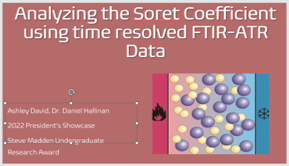President's Showcase
Ashley David She/Her/Hers
Supervising Professor: Dr. Daniel Hallinan
Ashley David is a senior majoring in Biomedical Engineering. She discovered her passion for research after joining Dr. Hallinan’s Polymers for Advanced Energy Sustainability her junior year. Since then, she has worked on analyzing the Soret Effect to use in energy re-harvesting capacities, earning the support of the MagLabs REU program in Summer 2022. She is continuing this Soret effect research as part of her undergraduate honorsin the major thesis, and hopefully soon to have her work published. Along with this, she works on the website design team for the RIDER Center at the FAMU-FSU College of Engineering, a research center devoted to using innovative technologies to promote all-inclusive and equitable disaster resilience for vulnerable populations. After graduating from FSU, Ashley plans to continue her studies at Ph.D. program in a biomedical field.
Abstract
A new method for measuring the Soret coefficient in opaque and translucent samples is reported. Time-resolved Fourier-transform infrared spectroscopy with attenuated total reflectance (FTIR-ATR) is used to measure the change in concentration near the heated ATR crystal surface. A temperature gradient is imposed on the sample via a water-bath cooled anvil in contact with the opposite surface of the sample. The sample used is a polymer electrolyte composed of lithium bis-trifluoromethanesulfonylimide (LiTFSI) salt in a block copolymer polystyrene-poly(ethylene oxide) (SEO). This study varies equilibrium salt concentrations and examines three temperature gradients, analyzing the effect on the magnitude of the Soret coefficient. This phenomena can be utilized in thermogalvanic cells, re-harvesting wasted heat from most power generating systems. Thermogalvanic cells are a way to utilize a heat sink to create electrical energy, having the temperature gradient drive the system. Specifically, the solid state electrolytes in these cells provide low flammability, high safety, and improved energy density, compared to common liquid electrolytes. Thus, application of the Soret effect is a clear way to greatly increase global energy efficiency. FTIR-ATR measures infrared absorbance of the salt which is related to concentration through the Beer Lambert law. This technique overcomes previous limitations to experimental techniques measuring the Soret Coefficient, making the FTIR-ATR an effective and repeatable instrument to use for collecting diffusion coefficients.
Presentation Materials
Project Materials
Project Documents and Links
https://rider.eng.famu.fsu.edu/
https://nationalmaglab.org/education/college-students-early-career-scientists/reu


